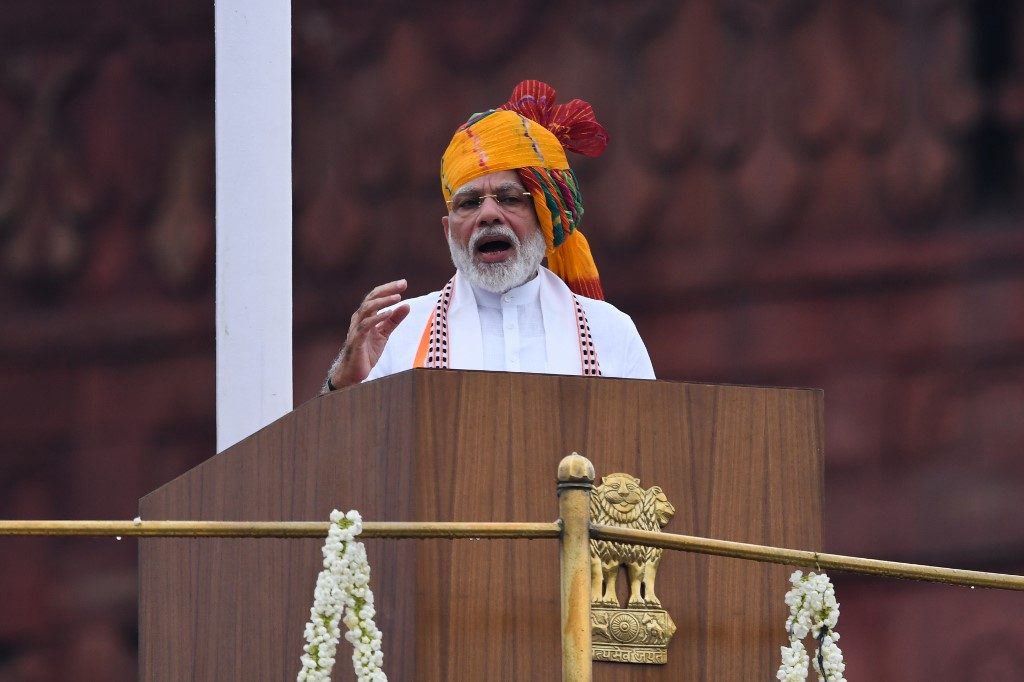SUMMARY
This is AI generated summarization, which may have errors. For context, always refer to the full article.

NEW DELHI, India – Indian Prime Minister Narendra Modi hailed on Thursday, August 15, his “path-breaking” move to strip Kashmir of its autonomy, as his Pakistani counterpart warned of possible “ethnic cleansing.”
Parts of Kashmir that India controls – it is split with arch-rival Pakistan – have been under lockdown since August 4, with freedom of movement restricted and phones and the internet cut.
A day later, New Delhi scrapped Article 370 in the Indian constitution that had granted Kashmir special status, splitting the state of Jammu and Kashmir in two and downgrading them to union territories.
In a speech from the ramparts of the historic Red Fort in Delhi for Indian Independence Day, Modi said that the decision was one of several “path-breaking” moves by his newly reelected administration.
He said “fresh thinking” was needed after 7 decades of failure to ensure harmony in the picturesque but tragic former Himalayan kingdom, where tens of thousands have died in the past 30 years.
“We do not believe in creating problems or prolonging them. In less than 70 days of the new government, Article 370 has become history. And in both houses of parliament, two-thirds of the members supported this step,” said Modi, 68.
“The old arrangement in Jammu, Kashmir and Ladakh encouraged corruption and nepotism, as well as injustice when it came to rights of women, children, (low-caste) Dalits, tribal communities,” he said.
“Their dreams get new wings.”
Extra troops
Fearing unrest over India’s latest move, tens of thousands of extra Indian troops have been deployed to Kashmir – joining 500,000 already there – turning parts of the main city of Srinagar into a fortress of roadblocks and barbed wire.
Sher-i-Kashmir Cricket Stadium, where the main Independence Day ceremonies were held in Srinagar, was cordoned off by security personnel, with drones and helicopters monitoring the area.
Jammu and Kashmir governor Satya Pal Malik hoisted an Indian flag and inspected a police guard of honor, watched on by India’s national security adviser Ajit Doval.
There were few locals at the ceremony, with most of the spectators from the government or security forces, an Agence France-Presse (AFP) reporter in Srinagar said.
Hundreds of artists and students from Hindu-majority Jammu, a major city south of Srinagar, were ferried in on buses and planes to perform at the function.
“We reached Srinagar on Tuesday and have been rehearsing our dance act in the stadium since yesterday,” Anita Sharma from Jammu told AFP.
Kashmiri politicians were missing from the event. The politicians, alongside university professors, business leaders and activists, are among more than 500 people taken into custody in the region.
“Restrictions will continue in some places of Kashmir for some time,” local police official Munir Khan told Indian media.
In neighborhoods, some residents observed Pakistan’s Independence Day on Wednesday, August 14, by setting off firecrackers and hoisting its national flag.
‘Black Day’
Pakistan meanwhile observed “Black Day” to coincide with Indian Independence Day to protest the Kashmir decision. Pakistani Prime Minister Imran Khan replaced his Twitter profile photo with a black circle.
Khan, who has compared Modi’s government to Nazi Germany, on Thursday took to Twitter to voice his alarm.
“Will world silently witness another Srebrenica-type massacre & ethnic cleansing of Muslims in IOK? (Indian-occupied Kashmir),” Khan wrote, referring to the killing of Muslim men and boys in Yugoslavia in 1995.
“I want to warn international community if it allows this to happen, it will have severe repercussions & reactions in the Muslim world setting off radicalization & cycles of violence.”
Kashmir has been divided between India and Pakistan since independence from Britain in 1947, and has been the spark for two major wars and countless clashes between the two nuclear-armed arch-rivals, most recently in February when they conducted tit-for-tat air strikes.
Modi’s 90-minute speech ended with the prime minister leading chants of “Jai Hind” (“Long live India”) with schoolchildren dressed in the saffron, white and green of the Indian flag, before a rendition of the national anthem. – Rappler.com
Add a comment
How does this make you feel?
There are no comments yet. Add your comment to start the conversation.